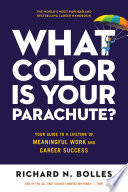

The first key idea in 'What Color Is Your Parachute?' is the importance of self-assessment in the job search process. The author, Richard N. Bolles, emphasizes that understanding your own skills, interests, and values is crucial for finding a job that not only pays the bills but also provides personal satisfaction. Self-assessment involves reflecting on your past experiences, identifying your strengths and weaknesses, and determining what you truly enjoy doing. This process can include taking various assessments and inventories, such as the Flower Exercise, which helps individuals visualize their skills and passions. By conducting a thorough self-assessment, job seekers can create a clearer picture of what they want and need in a career, making it easier to target their job search effectively. Bolles argues that many people fail to find fulfilling work because they do not take the time to understand themselves first.
Continue readingNetworking is another fundamental concept in Bolles' book. He asserts that many job opportunities are not advertised and that most positions are filled through personal connections. Therefore, building and maintaining a strong network is essential for job seekers. Bolles provides strategies for effective networking, such as reaching out to friends, family, and former colleagues, as well as attending industry events and joining professional organizations. He encourages readers to approach networking as a way to build genuine relationships rather than simply a means to an end. By cultivating a network of contacts, individuals can gain insights into job openings, industry trends, and potential employers, significantly increasing their chances of success in their job search.
Continue readingUnderstanding the job market landscape is crucial for job seekers, and Bolles dedicates a section of the book to this topic. He discusses the changes in the job market over the years, including the shift from traditional employment to freelance and gig work. Bolles highlights the importance of adaptability and being open to various forms of employment, as opportunities may not always come in the expected package. He encourages readers to stay informed about industry trends and to be proactive in seeking out new opportunities, whether through job boards, social media, or direct outreach to companies. By understanding the current job market dynamics, individuals can better position themselves for success.
Continue readingBolles provides practical advice on crafting effective resumes and cover letters. He emphasizes that these documents should not merely list job responsibilities but should instead focus on accomplishments and how the individual can add value to potential employers. The author advocates for tailoring resumes and cover letters to each job application, highlighting relevant skills and experiences that align with the specific role. He also discusses the importance of including keywords that match the job description, as many companies use applicant tracking systems to filter candidates. By creating compelling and targeted application materials, job seekers can significantly improve their chances of getting noticed by hiring managers.
Continue readingPreparing for interviews is a critical step in the job search process, and Bolles provides a comprehensive guide to this aspect. He emphasizes the importance of researching the company and the role before the interview, as well as practicing common interview questions. Bolles encourages readers to develop a personal pitch that articulates their strengths and experiences succinctly. He also discusses the significance of body language and non-verbal communication during interviews, as these elements can significantly impact the impression one makes on interviewers. By being well-prepared and confident, job seekers can leave a lasting positive impression during interviews.
Continue readingFollowing up after interviews and networking meetings is an often-overlooked aspect of the job search process. Bolles stresses that a thoughtful follow-up can set candidates apart from others. This can include sending thank-you emails to interviewers, reiterating interest in the position, and expressing gratitude for the opportunity to interview. Additionally, Bolles suggests following up with networking contacts to maintain relationships and keep oneself on their radar for future opportunities. By implementing a consistent follow-up strategy, job seekers can demonstrate professionalism and reinforce their interest in the positions they are pursuing.
Continue readingFinally, Bolles emphasizes the importance of embracing change and committing to lifelong learning in one's career. The job market is constantly evolving, and individuals must be willing to adapt to new technologies, industries, and work environments. Bolles encourages readers to seek out opportunities for professional development, whether through formal education, online courses, or self-directed learning. By cultivating a growth mindset and staying curious, individuals can enhance their employability and remain competitive in the job market. This adaptability is crucial for long-term career success, as it enables individuals to pivot when necessary and seize new opportunities as they arise.
Continue readingThe reading time for What Color Is Your Parachute? depends on the reader's pace. However, this concise book summary covers the 7 key ideas from What Color Is Your Parachute?, allowing you to quickly understand the main concepts, insights, and practical applications in around 21 min.
What Color Is Your Parachute? is definitely worth reading. The book covers essential topics including Self-Assessment, Networking, The Job Market Landscape, providing practical insights and actionable advice. Whether you read the full book or our concise summary, What Color Is Your Parachute? delivers valuable knowledge that can help you improve your understanding and apply these concepts in your personal or professional life.
What Color Is Your Parachute? was written by Richard N. Bolles.
If you enjoyed What Color Is Your Parachute? by Richard N. Bolles and want to explore similar topics or deepen your understanding, we highly recommend these related book summaries:
These books cover related themes, complementary concepts, and will help you build upon the knowledge gained from What Color Is Your Parachute?. Each of these summaries provides concise insights that can further enhance your understanding and practical application of the ideas presented in What Color Is Your Parachute?.